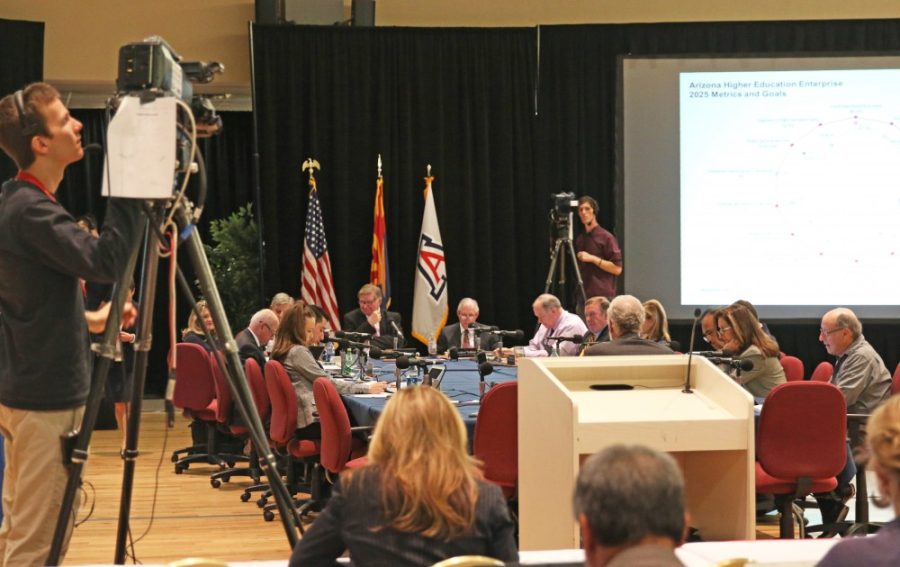The Arizona Board of Regents discussed proposed policy changes concerning both real estate transactions and tuition and fee development on Thursday, Nov. 16, during their meeting on campus.
Recent development projects have led the board to consider their current real estate transaction policy inadequate for addressing both off-campus and private on-campus development.
The university’s current real estate development projects include the off-campus development of a second tech park, The Bridges. The University of Arizona also attained the services of American Campus Communities, a private company, for the building of new Honors College facilities. For several months, the board office has been discussing how to reform their current real estate policies to better address these developments.
“What we’d like to do is kind of start over from a fresh standpoint,” said John Arnold, vice president for Business Management and Financial Affairs when he addressed the board, “to ensure that ABOR policies are robust enough and comprehensive enough to really capture all of these different types of transactions.”
The board office proposed the policy structural changes include the establishment of new subcommittees, defining requirements for establishing fair market value, defining board documentation requirement for leases and establishing reporting requirements for long-term and multi-faced projects. They cited the work they have done with the Novas Innovation Corridor as a potential guide.
The second item presented to the board for approval was discussion about tuition and fee development policy. This issue was believed to require attention, in a large part due to the enterprise’s continued growth and evolution of fees.
In 2014, the board acknowledged the need for “improving transparency and simplicity in tuition billing,” according to the board packet. They rejected a proposal giving more fee-setting power to the university president, but incorporated operational and financial reviews. These were designed in part to offer insight for students and their families into future tuition and fees.
Lorenzo Martinez, associate vice president for Finance and Administration, proposed the office’s plan to the board. This includes the establishment of a fee subcommittee, a potential sunset review process and establishing a summary or guide for students on fee development and processes.
Martinez described the first component of the proposed reform: “The main core of what we’re hoping to accomplish with this reform is to create transparency on the university fee development process,” Martinez said. He continued to say the reforms would include a focus on making sure those fees are implemented as intended.
The sunset review process would look at how the universities determine their number of fees and when fees might become program fees or base tuition. In addition, it would gather additional information on individual fee decision making and approval process within that.
Finally, the last component of the reform would offer students insight to the university and board fee development process, as well as identify points for where and how they can have input.
“I would love it if we could lower tuition, I would love it if we could lower fees and I do applaud this effort,” said Regent Rick Myers before the approval vote. “I just want to recommend to the board that we always keep our eye on outcomes. It’s not just how much we charge, it’s what we do with that money and if we’re doing the right things … that’s got to be factored in, too.”
After Myers’ statement, the board voted in approval of the tuition and fees development reform proposal. At January’s Business and Finance committee meeting, the office will present their progress and submit the actual proposed policy revisions.
Currently, the fee setting and management process at the UA is being audited by the Arizona Auditor General, Debra Davenport. Her report is anticipated to be published by the Jan. 25 meeting.
The Daily Wildcat will follow up on these proposed policy changes as more information is made available.
Follow the Daily Wildcat on Twitter








